-
2025
Previous Year Paper
-
2024
Previous Year Paper
-
2023
Previous Year Paper
-
2022
Previous Year Paper
-
2021
Previous Year Paper
-
2020
Previous Year Paper
-
2019
Previous Year Paper
-
2018
Previous Year Paper
-
2017
Previous Year Paper
-
2016
Previous Year Paper
-
2015
Previous Year Paper
-
2014
Previous Year Paper
-
2013
Previous Year Paper
-
2012
Previous Year Paper
-
2011
Previous Year Paper
-
2010
Previous Year Paper
-
2009
Previous Year Paper
-
2008
Previous Year Paper
-
2007
Previous Year Paper
With these papers, you will get a number of valuable insights that allow you to get familiar with the exam pattern, understand question trends, as well as develop good time management skills.
Through our platform, we aim to provide free access to the GATE PYQs. With the practice of past questions, you can check your level of understanding and achieve a higher score in the actual exam.
Tentative Schedule For The Upcoming Graduate Aptitude Test In Engineering
For your reference, we have mentioned the list of tentative months in which the upcoming GATE examination might be conducted.
| EVENT | TENTATIVE MONTHS |
|---|---|
|
GATE Online Application Processing System (GOAPS) opens |
August 2025 |
|
Closing date of regular online registration/applications |
September 2025 |
|
End of extended period for online registration/application (with late fee) |
October 2025 |
|
Last date for change of Category, Paper, and Examination City, adding a new test paper, and change of personal details (additional fee applicable per change) |
November 2025 |
|
Admit Cards available for download |
January 2026 |
|
GATE 2026 Examination Month |
February 2026 |
|
Announcement of results in the GATE Online Application Processing System (GOAPS) |
March 2026 |
|
Score Cards available for free download |
March to May 2026 |
|
Score Cards are available for download by paying a fee of Rs. 500 per test paper |
June to December 2026 |
Pattern Of The Graduate Aptitude Test In Engineering
Below is a detailed table in which you can find all the important information regarding this examination.
| PARTICULARS | DETAILS |
|---|---|
|
Full Name of the Examination |
GATE: Graduate Aptitude Test in Engineering |
|
GATE 2025 Organizing Institute |
IIT Roorkee |
|
Mode of the Examination |
Computer-Based Test (CBT) |
|
Examination Duration |
3 hours |
|
Number of Subjects (Papers) |
30 test papers |
|
Sections in the Examination |
General Aptitude (GA) + Candidate’s Selected Subject(s) |
|
Types of Questions |
|
|
Test of Abilities |
|
|
Number of Questions |
Total: 65 questions
|
|
Distribution of Marks in all Papers EXCEPT AR, CY, DA, EY, GG, MA, PH, ST, XH and XL |
Total: 100 marks
(**XE includes an Engineering Mathematics section XE-A of 15 marks) |
|
Distribution of Marks in Papers AR, CY, DA, EY, GG, MA, PH, ST, XH and XL |
Total: 100 marks
|
|
Marking Scheme |
Questions carry 1 mark and 2 marks |
|
Negative Marking |
|
GATE Previous Year Papers For Several Years
At SelfStudys, you will get a number of GATE previous year papers for absolutely free practice. When you solve the questions from various past papers, you can check out the concepts that are frequently tested and focus on them during your study sessions. To get direct access to any of these year-wise past papers, you can use the links that are mentioned below.
Subject-Wise GATE Exam Previous Year Question Paper PDF
As the GATE examination is conducted for various subjects, we provide the GATE previous year question papers with solutions for most of them. This enables you to practice the paper on a particular subject that you want to attempt in the real exam. You can choose these subject-wise papers directly from the access links given below.
| SR No | Subject-Wise GATE Exam PYQ |
|---|---|
| 1 | |
| 2 | |
|
3 |
|
|
4 |
|
|
5 |
GATE Previous Year Question Papers With Solutions
Every GATE exam previous year question paper PDF comes with accurate and detailed solutions to the questions. You can find them in the last few pages of the PDF. These solutions are created carefully by our subject-matter experts after analyzing each and every question. Once you have attempted the paper by yourself, you should go through the given solutions to verify your responses. This will help you to notice your weaker areas as well as understand the reasoning behind each solution.
Eligibility Criteria For Graduate Aptitude Test In Engineering
In this section, we have given the criteria that you need to fulfill to appear in this examination.
| DEGREE/ PROGRAM | QUALIFYING DEGREE/ EXAMINATION | DETAILS |
|---|---|---|
|
B.E./ B.Tech./ B.Pharm. |
Bachelor’s degree in Engineering/ Technology (4 years after 10+2 or 3 years after B.Sc./ Diploma in Engineering/ Technology) |
Currently in the 3rd year or higher or already completed. |
|
B. Arch. |
Bachelor’s degree in Architecture (5 year course)/ Naval Architecture (4 year course)/ Planning (4 year course) |
Currently in the 3rd year or higher or already completed. |
|
B.Sc. (Research)/ B.S. |
Bachelor’s degree in Science (Post-Diploma/ 4 years after 10+2) |
Currently in the 3rd year or higher or already completed. |
|
Pharm. D. (after 10+2) |
6 years degree program, consisting of internship or residency training, from the third year onwards |
Currently in the 3Rd/ 4th/ 5th/ 6th year or already completed. |
|
M.B.B.S./ B.D.S./ B.V.Sc. |
Degree holders of M.B.B.S./ B.D.S./ B.V.Sc. and those who are in the 5th/6th/7th semester or higher semester of such program. |
5th/ 6th/ 7th or higher semester or already completed. |
|
M.Sc./ M.A./ M.C.A. or equivalen |
Master’s degree in any branch of Arts/ Science/ Mathematics/ Statistics/ Computer Applications or equivalent. |
Currently in the first year or higher or already completed. |
|
Int. M.E./ M.Tech. (Post-B.Sc.) |
Post-B.Sc.Integrated Master’s degree programs in Engineering/Technology (4 year program). |
Currently in the 1st/ 2nd/ 3rd/ 4th year or already completed. |
|
Int. M.E./ M.Tech./ M.Pharm. or Dual Degree (after Diploma or 10+2) |
Integrated Master’s degree program or Dual Degree program in Engineering/Technology (5 year program). |
Currently in the 3rd / 4th/5th year or already completed. |
How To Get The GATE Exam Previous Year Question Paper PDF Download From Our Website?
You need to follow the steps that are mentioned here for easy access to any GATE exam previous year question paper PDF download on our digital platform. A stable internet connection is the only requirement to complete the downloading process.
- Firstly, visit our website by either searching for SelfStudys or typing the link www.selfstudys.com on a web browser.

- Once the homepage is opened, you can simply scroll down and reach the ‘Free Study Materials’ section.
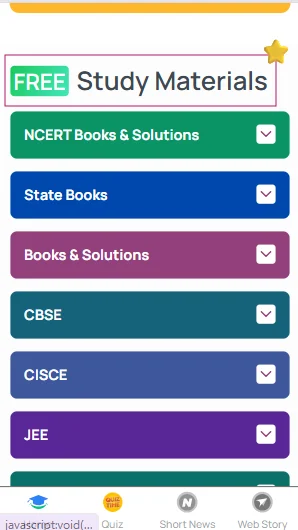
- There you will see the list of all our major categories. You have to select the ‘GATE’ option from this list.

- Now, a drop-down menu will be available from where you need to click on the ‘GATE PYQs’ icon.
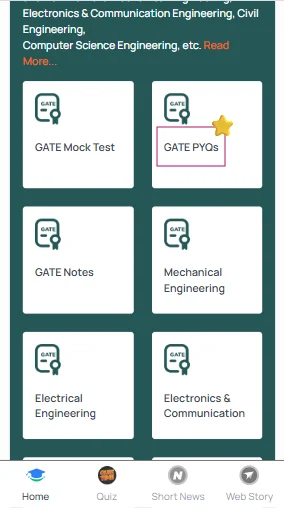
- On a new web page, you can see the GATE previous year question paper for all the years.
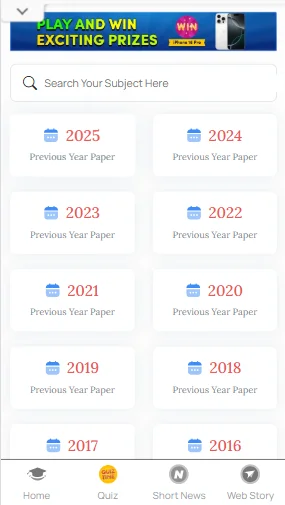
- You can select any of the GATE previous year papers to open its subject-wise list.
- Again, you will be directed to a new page where you may choose the GATE previous year question papers with solutions for a specific subject that you want to attempt or download.
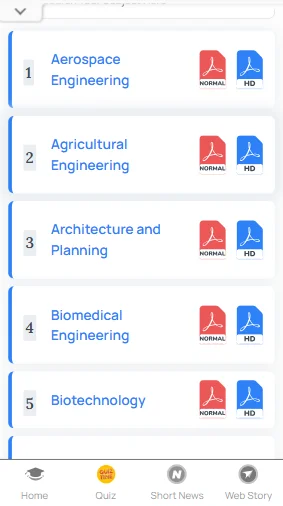
- Lastly, your chosen GATE exam previous year question paper PDF will be visible on the screen.
- You can attempt the paper online or save the GATE exam previous year question paper PDF download for later practice.
Note: The GATE previous year question paper downloading will be available after you Log In or Sign Up through Google on SelfStudys.
List Of GATE Papers And Their Corresponding Codes
The latest Graduate Aptitude Test in Engineering will be conducted for 30 test papers. In the table given below, you can have a look at the list of the papers in the test as well as their codes.
| TEST PAPER | CODE | TEST PAPER | CODE |
|---|---|---|---|
|
Aerospace Engineering |
AE |
Agricultural Engineering |
AG |
|
Architecture and Planning |
AR |
Biomedical Engineering |
BM |
|
Biotechnology |
BT |
Civil Engineering |
CE |
|
Chemical Engineering |
CH |
Computer Science and Information Technology |
CS |
|
Chemistry |
CY |
Data Science and Artificial Intelligence |
DA |
|
Electronics and Communication Engineering |
EC |
Electrical Engineering |
EE |
|
Environmental Science and Engineering |
ES |
Ecology and Evolution |
EY |
|
Geomatics Engineering |
GE |
Geology and Geophysics |
GG |
|
Instrumentation Engineering |
IN |
Mathematics |
MA |
|
Mechanical Engineering |
ME |
Mining Engineering |
MN |
|
Metallurgical Engineering |
MT |
Naval Architecture and Marine Engineering |
NM |
|
Petroleum Engineering |
PE |
Physics |
PH |
|
Production and Industrial Engineering |
PI |
Statistics |
ST |
|
Textile Engineering and Fibre Science |
TF |
Engineering Sciences |
XE* |
|
Humanities and Social Sciences |
XH** |
Life Sciences |
XL*** |
The XE* (Engineering Sciences), XH** (Humanities and Social Sciences), and XL*** (Life Sciences) papers are of a general nature and they comprise different sections that we have listed in the table below.
|
XE* PAPER SECTIONS & CODE |
XH** PAPER SECTIONS & CODE |
XL*** PAPER SECTIONS & CODE |
|||
|
Engineering Mathematics (Compulsory) (15 marks) |
A |
Reasoning and Comprehension (Compulsory) (25 marks) |
B1 |
Chemistry (Compulsory) (25 marks) |
P |
|
ANY TWO OPTIONAL SECTIONS (35 marks for each section, Total 70 marks) |
ANY ONE OPTIONAL SECTION (60 marks) |
ANY TWO OPTIONAL SECTIONS (30 marks for each section, Total 60 marks) |
|||
|
Fluid Mechanics |
B |
Economics |
C1 |
Biochemistry |
Q |
|
Materials Science |
C |
English |
C2 |
Botany |
R |
|
Solid Mechanics |
D |
Linguistics |
C3 |
Microbiology |
S |
|
Thermodynamics |
E |
Philosophy |
C4 |
Zoology |
T |
|
Polymer Science and Engineering |
F |
Psychology |
C5 |
Food Technology |
U |
|
Food Technology |
G |
Sociology |
C6 |
||
|
Atmospheric and Ocean Sciences |
H |
||||
Two Test Papers Combination That Are Allowed In GATE
You are allowed to appear in only ONE or TWO paper combinations in this examination. Also, you can only choose this combination from the given ones below.
|
CODE OF THE PRIMARY PAPER |
CODES OF PAPERS ALLOWED AS THE SECONDARY PAPER |
CODE OF THE PRIMARY PAPER |
CODES OF PAPERS ALLOWED AS THE SECONDARY PAPER |
|
AE |
CE, ME, XE |
GE |
AR, CE, CS, ES, GG |
|
AG |
CE |
GG |
GE |
|
AR |
CE, GE |
IN |
BM, EC, EE, ME |
|
BM |
BT, IN |
MA |
CS, DA, PH, ST |
|
BT |
BM, XL |
ME |
AE, DA, IN, NM, PI, XE |
|
CE |
AE, AG, AR, ES, GE, NM, XE |
MT |
XE |
|
CH |
ES, PE, XE |
NM |
CE, ME |
|
CS |
DA, EC, GE, MA, PH, ST |
PE |
CH |
|
CY |
XE, XL |
PH |
CS, DA, EC, EE, MA, XE |
|
DA |
CS, EC, EE, MA, ME, PH, ST, XE |
PI |
ME, XE |
|
EC |
CS, DA, EE, IN, PH |
ST |
CS, DA, MA, XH |
|
EE |
DA, EC, IN, PH |
XE |
AE, CE, CH, CY, DA, ME, MT, PH, PI |
|
ES |
CE, CH, GE |
XH |
ST |
|
EY |
XL |
XL |
BT, CY, EY |
Benefits Of Practicing GATE PYQs
Solving the GATE PYQs is not just revising old questions but a strategic method of exam preparation. Some unique benefits that you will gain by solving them are mentioned in the points below.
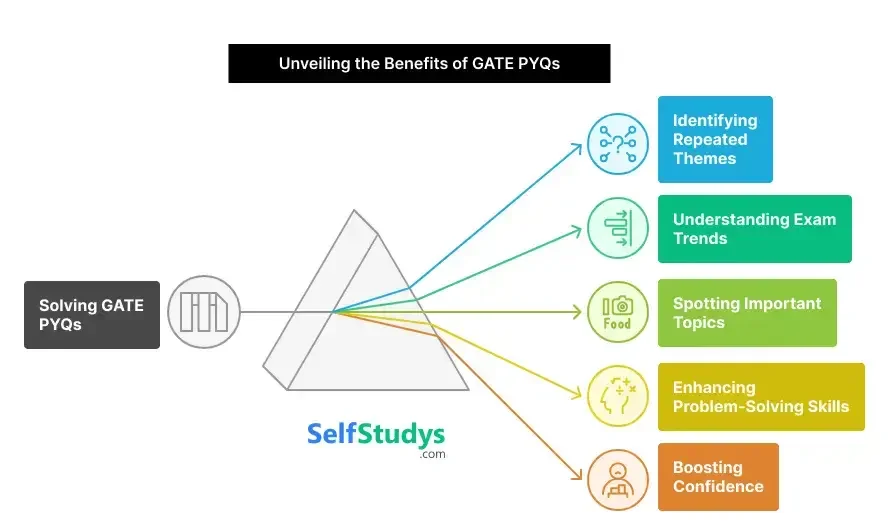
- Every paper of this test follows a particular structure but there are some changes in topics, framing of questions, and difficulty levels. So, when you solve multiple GATE previous year papers, you can observe the repeated themes and important topics easily. You can also spot any changes in the exam trends and plan properly for the exam.
- With the practice of GATE previous year question papers with solutions under time conditions, you can replicate the actual environment of the exam. It helps you allot proper time for each section as well as questions. You will also learn how to skip the questions that are very time-consuming or less important.
- After solving a few GATE exam previous year question paper PDFs, you will start seeing the areas where you are losing marks again and again. Then, you can plan a revision strategy on the basis of your actual performance.
- In the GATE exam previous year question paper PDF download, you will find some questions that are quite tricky. By attempting them, you can solidify your conceptual understanding to the next level. Additionally, you can learn different methods to solve any specific problem.
- Through repeated practice of the GATE previous year question paper, you will feel more prepared for what to expect in the exam which will ultimately reduce any anxiety. This will also build your mental for the entire exam duration.
Important Topics That Are Covered In The GATE Previous Year Papers
It is necessary that you are aware of the topics from which the GATE PYQs are created. That’s why, we have described the important topics of the past papers in the table below. You should study these topics deeply before attempting the question papers for better results.
|
GATE SYLLABUS CONTENT |
||||||
|
SECTION/ SUBJECT |
IMPORTANT TOPICS |
|||||
|
General Aptitude |
Verbal Aptitude
|
|||||
|
Quantitative Aptitude
|
||||||
|
Analytical Aptitude
|
||||||
|
Spatial Aptitude
|
||||||
|
Aerospace Engineering |
Engineering Mathematics |
|||||
|
Core Topics: Linear Algebra, Calculus, Differential Equations |
Special Topics: Fourier Series, Laplace Transforms, Numerical methods for linear and nonlinear algebraic equations, Numerical integration and differentiation. Complex analysis. Probability and statistics |
|||||
|
Flight Mechanics |
||||||
|
Core Topics: Atmosphere, Airplane performance, Static stability, |
Special Topics: Dynamic stability: Euler angles; Equations of motion; Decoupling of longitudinal and lateral-directional dynamics; longitudinal modes; lateral-directional modes. |
|||||
|
Space Dynamics |
||||||
|
Core Topics: Central force motion, determination of trajectory, and orbital period in simple cases. Kepler’s laws; escape velocity. |
Special Topics: None |
|||||
|
Aerodynamics |
||||||
|
Core Topics: Basic Fluid Mechanics, Potential flow theory, Airfoils and wings, Compressible Flows |
Special Topics: Wind Tunnel Testing: Measurement and visualization techniques. Shock - boundary layer interaction. |
|||||
|
Structures |
||||||
|
Core Topics: Strength of Materials, Flight vehicle structures, Structural Dynamics |
Special Topics: Vibration of beams. Theory of elasticity: Equilibrium and compatibility equations, Airy’s stress function. |
|||||
|
Propulsion |
||||||
|
Core Topics: Basics, Aerothermodynamics of aircraft engines, Engine performance, Turbomachinery, Centrifugal compressor, Axial turbines, Rockets |
Special Topics: Aerothermodynamics of non-rotating propulsion components such as intakes, combustors, and nozzles. Turbine blade cooling. Compressor-turbine matching, Surge, and stall. |
|||||
|
Agricultural Engineering |
Engineering Mathematics: Linear Algebra, Calculus, Vector Calculus, Differential Equations, Probability and Statistics, Numerical Methods |
|||||
|
Farm Machinery: Machine Design, Farm Machinery |
||||||
|
Farm Power: Sources of Power, Farm Power, Tractors and Power tillers |
||||||
|
Soil and Water Conservation Engineering: Fluid Mechanics, Soil Mechanics, Hydrology, Surveying and Leveling, Soil and Water Erosion, Watershed Management |
||||||
|
Irrigation and Drainage Engineering: Soil-Water-Plant Relationship, Irrigation Water Conveyance and Application Methods, Agricultural Drainage, Groundwater Hydrology, Wells and Pumps |
||||||
|
Agricultural Process Engineering: Engineering properties of agricultural produce, Evaporation and Drying, Size Reduction and Material Handling, Processing of agricultural produce, Storage Systems |
||||||
|
Dairy and Food Engineering: Heat and Mass Transfer, Preservation of Food |
||||||
|
Architecture and Planning |
Common |
|||||
|
Architecture, Planning, and Design |
Construction and Management |
|||||
|
Environmental Planning and Design |
Urban Design, landscape, and Conservation |
|||||
|
Planning Process |
Housing |
|||||
|
Services and Infrastructure |
- |
|||||
|
Part B1: Architecture |
||||||
|
History and Contemporary Architecture |
Building Construction and Structural systems |
|||||
|
Building Services and Sustainability |
||||||
|
Part B2: Planning |
||||||
|
Regional and Settlement Planning |
Planning Techniques and Management |
|||||
|
Infrastructure Planning |
- |
|||||
|
Biomedical Engineering |
Engineering Mathematics: Linear Algebra, Calculus, Differential Equations, Analysis of complex variables, Probability and Statistics, Numerical Methods |
|||||
|
Electrical Circuits |
Signals and Systems |
Analog and Digital Electronics |
||||
|
Measurements and Control Systems |
Sensors and Bioinstrumentation |
Human Anatomy and Physiology |
||||
|
Medical Imaging Systems |
Biomechanics |
Biomaterials |
||||
|
Biotechnology |
Engineering Mathematics: Linear Algebra, Calculus, Differential Equations, Probability and Statistics, Numerical Methods |
|||||
|
General Biology: Biochemistry, Microbiology, Immunology, |
||||||
|
Genetics, Cellular and Molecular Biology: Genetics and Evolutionary Biology, Cell Biology, Molecular Biology |
||||||
|
Fundamentals of Biological Engineering: Engineering Principles Applied to Biological Systems, Classical Thermodynamics and Bioenergetics, Transport Processes |
||||||
|
Bioprocess Engineering and Process Biotechnology: Bioreaction Engineering, Upstream and Downstream Processing, Instrumentation and Process Control |
||||||
|
Plant, Animal, and Microbial Biotechnology: Plants, Animals, Microbes |
||||||
|
Recombinant DNA technology and Other Tools in Biotechnology: Recombinant DNA technology, Molecular tools, Analytical tools, Computational tools |
||||||
|
Civil Engineering |
Engineering Mathematics: Linear Algebra, Calculus, Ordinary Differential Equation, Partial Differential Equation, Probability and Statistics, Numerical Methods |
|||||
|
Structural Engineering: Engineering Mechanics, Solid Mechanics, Structural Analysis, Construction Materials and Management, Concrete Structures, Steel Structures |
||||||
|
Geotechnical Engineering: Soil Mechanics, Foundation Engineering |
||||||
|
Water Resources Engineering: Fluid Mechanics, Hydraulics, Hydrology, Irrigation |
||||||
|
Environmental Engineering: Water and Waste Water Quality and Treatment, Air Pollution, Municipal Solid Wastes |
||||||
|
Transportation Engineering: Transportation Infrastructure, Highway Pavements, Traffic Engineering |
||||||
|
Geomatics Engineering: Principles of Surveying, Photogrammetry, and Remote Sensing |
||||||
|
Chemical Engineering |
Engineering Mathematics: Linear Algebra, Calculus, Differential Equations, Complex Variables, Probability and Statistics, Numerical Methods |
|||||
|
Process Calculations and Thermodynamics |
Fluid Mechanics and Mechanical Operations |
Heat Transfer |
||||
|
Mass Transfer |
Chemical Reaction Engineering |
Instrumentation and Process Control |
||||
|
Plant Design and Economics |
Chemical Technology |
- |
||||
|
Computer Science and Information Technology |
Engineering Mathematics: Discrete Mathematics, Linear Algebra, Calculus, Probability and Statistics |
|||||
|
Digital Logic |
Computer Organization and Architecture |
Programming and Data Structures |
||||
|
Algorithms |
Theory of Computation |
Compiler Design |
||||
|
Operating System |
Databases |
Computer Networks |
||||
|
Data Science and Artificial Intelligence |
Probability and Statistics |
Linear Algebra |
Calculus and Optimization |
|||
|
Programming, Data Structures and Algorithms |
Database Management and Warehousing |
Machine Learning |
||||
|
AI |
- |
- |
||||
|
Electronics and Communication Engineering |
Engineering Mathematics: Linear Algebra, Calculus, Differential Equations, Vector Analysis, Complex Analysis, Probability and Statistics |
|||||
|
Networks, Signals, and System: Circuit Analysis, Continuous-time Signals, Discrete-time Signals |
||||||
|
Electronic Devices: Carrier Transport |
||||||
|
Analog Circuits: Diode Circuits, BJT and MOSFET Amplifiers, Op-amp Circuits |
||||||
|
Digital Circuits: Number Representations, Sequential Circuits, Data Converters, Semiconductor Memories, Computer Organization |
||||||
|
Control Systems: Basic control system components, Feedback principle, Transfer function |
||||||
|
Communications: Random Processes, Analog Communications, Information Theory, Digital Communications |
||||||
|
Electromagnetics: Maxwell's Equations, Plane Waves and Properties, Transmission Lines |
||||||
|
Electrical Engineering |
Engineering Mathematics: Linear Algebra, Calculus, Differential Equations, Complex Variables, Probability and Statistics |
|||||
|
Electric circuits |
Electromagnetic Fields |
Signals and Systems |
||||
|
Electrical Machines |
Power Systems |
Control Systems |
||||
|
Electrical and Electronic Measurements |
Analog and Digital Electronics |
Power Electronics |
||||
|
Environmental Science and Engineering |
Mathematics Foundation: Linear Algebra, Calculus, Differential Equations, Probability and Statistics |
|||||
|
Environmental Chemistry: Fundamentals of Environmental Chemistry, Principles of Water Chemistry, Soil Chemistry, Atmospheric Chemistry |
||||||
|
Environmental Microbiology: Prokaryotic and Eukaryotic Microorganisms, Cell Chemistry and Cell Biology, Microbial Metabolism, Growth and Control of Microorganisms, Microbiology and Health |
||||||
|
Water Resources and Environmental Hydraulics: Global Water Resources, Surface Water Resources, Groundwater Resources, Environmental Hydraulics |
||||||
|
Water and Wastewater Treatment and Management: Water and wastewater quality parameters, Water treatment methods, Kinetics and reactor design |
||||||
|
Air and Noise Pollution: Particulate Pollutants, Gaseous Pollutants, Air Quality Management, Noise Pollution |
||||||
|
Solid and Hazardous Waste Management: Municipal solid waste management, Hazardous waste management, Management of biomedical waste, plastic waste, and E-waste |
||||||
|
Global and Regional Environmental Issues: Global effects of air pollution, Ecology, and various ecosystems |
||||||
|
Environmental Management and Sustainable Development: Environmental Management Systems; ISO14000 series; Environmental Auditing, Environmental Law and Policy, Energy and Environment, Sustainable Development |
||||||
|
Ecology and Evolution |
Ecology: Fundamental Concepts, Population Ecology, Interactions, Community Ecology, Ecosystems Structure and Function |
|||||
|
Evolution: History of Evolutionary Thought, Fundamentals, Diversity of Life, Life History Strategies, Interactions, Population and Quantitative Genetics, Molecular Evolution and Phylogenetics, Macroevolution |
||||||
|
Mathematics and Quantitative Ecology: Mathematics and Statistics in Ecology, Statistical Hypothesis Testing |
||||||
|
Behavioral Ecology: Classical Ecology, Sensory Ecology, Foraging Ecology, Reproduction, Social Living |
||||||
|
Applied Ecology and Evolution: Biodiversity and Conservation, Disease Ecology and Evolution, Global Climate Change |
||||||
|
Instrumentation Engineering |
Engineering Mathematics: Linear Algebra, Calculus, Differential Equations, Analysis of Complex Variables, Probability and Statistics, Numerical Methods |
|||||
|
Electricity and Magnetism |
Electrical Circuits and Machines |
Signals and Systems |
||||
|
Control Systems |
Analog Electronics |
Digital Electronics |
||||
|
Measurements |
Sensors and Industrial Instrumentation |
Communication and Optical Instrumentation |
||||
Note: In the table below, we have added only a few of the subjects and their topics. For detailed information on other subjects' syllabi, you should visit the official website of the GATE exam.
Distribution Of Marks In Various Test Papers For GATE
Every test paper in this examination is of 100 marks. All the papers of this exam have a General Aptitude section which is for 15 marks. The remaining 85 marks depend on the subject that you choose. In the table below, we have described the distribution of marks regarding all the test papers.
|
PAPER CODE |
GENERAL APTITUDE MARKS |
SUBJECT: COMPULSORY SECTION |
SUBJECT: OPTIONAL SECTION |
TOTAL MARKS |
|
AE, AG, BM, BT, CE, CH, CS, EC, EE, ES, IN, ME, MN, MT, NM, PE, PI, TF; Subject marks in these papers include questions on Engineering Mathematics (13 marks), which are paper-specific. |
15 |
85 |
- |
100 |
|
CY, DA, EY, MA, PH, ST |
15 |
85 |
- |
100 |
|
AR: Part A is Common and Compulsory. Part B1/B2 can be selected during the exam. B1 - Architecture B2 - Planning |
15 |
60 |
25 |
100 |
|
GE: Part A is Common and Compulsory. Part B1/B2 can be selected during the exam. B1 - Surveying and Mapping B2 - Image Processing and Analysis |
15 |
55 |
30 |
100 |
|
GG: Part A is Common and Compulsory. Part B1/B2 must be chosen at the time of application. B1 - Geology B2 - Geophysics |
15 |
25 |
60 |
100 |
|
XE: Section A (Engineering Mathematics) is Common and Compulsory. Applicants must select any TWO of the other sections during the exam. |
15 |
15 |
2 Into 35 |
100 |
|
XH: Section B1 (Reasoning and Comprehension) is Common and Compulsory. Applicants must select any ONE of the other sections at the time of application. |
15 |
25 |
60 |
100 |
|
XL: Section P (Chemistry) is Common and Compulsory. Applicants must select any TWO of the other sections during the exam. |
15 |
25 |
2 Into 30 |
100 |
Mistakes Students Make While Solving The GATE Previous Year Question Paper
There are many common mistakes that aspirants make when they are solving the GATE PYQs. Through these mistakes, your preparation might be affected and not provide you with success in the real examination. We have created a table for these mistakes and how you can avoid them to score higher in the Graduate Aptitude Test in Engineering.
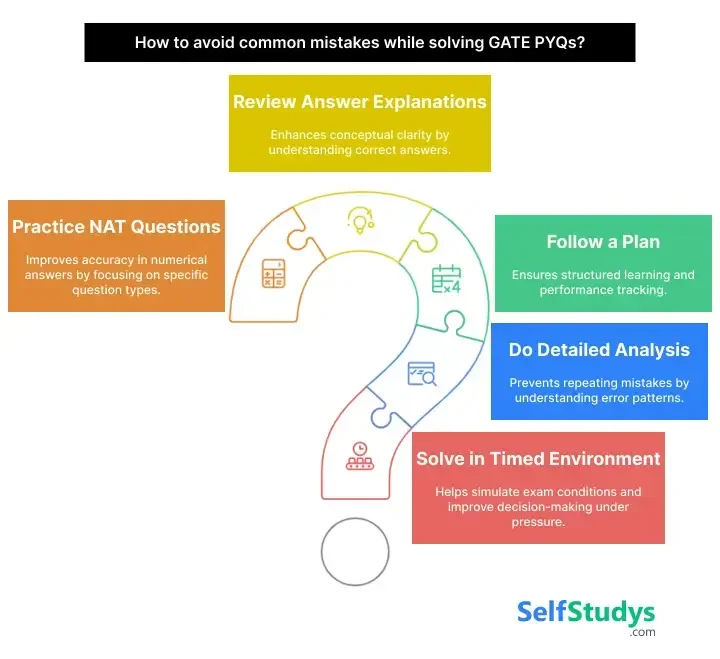
|
MISTAKE |
WHY IT MATTERS |
HOW TO AVOID IT |
|
Not Solving in a Timed Environment |
Without the pressure of time, you can get a wrong sense of preparedness. The stress that you get from improper time management affects your skills in making decisions as well as accuracy. |
It is advised that you always solve the GATE previous year papers in the 3-hour duration. For this, you can use a stopwatch or an online timer. |
|
Not Doing Detailed Analysis |
If you just solve the GATE previous year question papers with solutions, then it might not be enough. Not analyzing your mistakes means that you will repeat them again. |
After every attempt at the question papers, you should review your answers and note patterns in your errors. |
|
Solving the GATE Exam Previous Year Question Paper PDF Randomly |
Going through different years or subjects PYPs can break your learning. |
You must follow a proper plan like starting with year-wise or subject-wise papers. Then, you should track your performance timely to check for any improvement. |
|
Not Reviewing Answer Explanations |
Just guessing the answers or ignoring the logic behind them can lead to improper understanding. |
You should use the solutions that are provided in the GATE exam previous year question paper PDF download to understand why an answer is correct. Through this process, you can enhance your conceptual clarity. |
|
Ignoring NAT-Type Questions |
You don’t get any opinions to choose from in the Numerical Answer Type questions of the GATE previous year question paper. This is a common area for mistakes as they require accurate calculations. |
For such questions, you should separate practice sessions. Make sure that you get used to entering precise numerical answers as well as understand the rules. |
Zone-Wise Examination Centers For Graduate Aptitude Test In Engineering
There are different cities across the country where you can take the Graduate Aptitude Test in Engineering. You may select up to three cities from the list of exam cities that are mentioned in the table below.
|
ZONAL GATE OFFICE |
LIST OF EXAM CITIES/ TOWNS |
|
Zone 1 IISc Bengaluru Bengaluru- 560012 Email: helpdesk.gate@iisc.ac.in Phone nos.: 080-22932644 080-22932392/ 3333 |
|
|
Zone 2 IIT Bombay Powai, Mumbai- 400076 Email: gateoffice@iitb.ac.in Phone no.: 022-25767068 022-25767022 |
|
|
Zone 3 IIT Delhi Hauz Khas, New Delhi- 110016 Email: gate@admin.iitd.ac.in Phone no.: 011-26591749 |
|
|
Zone 4 IIT Guwahati Guwahati- 781039 Email: gate@iitg.ac.in Phone nos.: 0361-2582751/ 2582755 |
|
|
Zone 5 IIT Kanpur Kanpur- 208016 Email: gate@iitk.ac.in Phone nos.: 0512-2596962/ 2596963 |
|
|
Zone 6 IIT Kharagpur Kharagpur- 721302 Email: gateonline@adm.iitkgp.ac.in Phone nos.: 03222-282091/ 282095 |
|
|
Zone 7 IIT Madras Chennai- 600036 Email: gate@iitm.ac.in Phone no.: 044-22578200 |
|
|
Zone 8 IIT Roorkee Roorkee- 247667 Website: https://gate2025.iitr.ac.in Email: gate@iitr.ac.in Phone no.: 01332-284531 OI for GATE 2025 |
|
Best Books To Study For Graduate Aptitude Test In Engineering
It is important to have a good collection of books for the Graduate Aptitude Test in Engineering preparation. Below are some books that we recommend you to study for this examination.
|
SUBJECT |
BOOKS |
|
General Aptitude |
|
|
Engineering Mathematics |
|
|
Some Subject-Specific Books |
Computer Science and Information Technology
|
|
Electrical Engineering
|
|
|
Electronics and Communication Engineering
|
|
|
Mechanical Engineering
|
Conclusion
Practice of the GATE previous year papers is a great strategy that can build your confidence, sharpen your problem-solving skills, and help you understand the requirements of the exam. These papers also give you great insights into the question pattern, weightage of topics, exam trends, etc. In order to simplify your preparation, we provide you with free and easy access to a wide range of past papers. They are further categorized into year-wise and subject-wise PYPs. You should use these papers well, analyze your performance, and let them bring you one step closer to success in the examination.







 Profile
Profile Signout
Signout










 Quiz
Quiz
 Get latest Exam Updates
Get latest Exam Updates 










